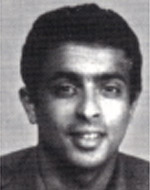Gazi, Avishai
Son of Shoshana and Sa’adia, was born on January 30, 1961, in Rehovot. Avishai attended the “Sinai” elementary school and the “Or Etzion” High School in the Shafir Center. He was an active member of the Bnei Akiva youth movement and participated in social activities and trips. Avishai was one of the initiators of these trips. He was very attached to his home and family and cultivated a garden in the yard of his house. When he finished high school, Avishai moved to the hesder yeshiva in Kiryat Shmona. In 1980, he was drafted into the regular army service. Avishai served in the Armored Corps as a tank driver. He excelled in physical and mental strength, and represented his battalion in sports events. With the outbreak of the Peace for Galilee war, Avishai and his unit left for Lebanon. On the fourth day of the war, June 10, 1982, he fell in battle in the outskirts of Beirut, north of the town of Damur, when the Sagger missile hit his tank and Avishai was killed along with the entire tank crew. After his death he was promoted to corporal, 21 years old, and Avishai was buried in the military cemetery in Rehovot, where he left behind his parents, brother and sister. The days of fighting were Avishai in the tank that led the company until it fell on the southern outskirts of Beirut, north of Damur. Avishai was driving the tank commander’s tank, and the tank had a means of removing mines. Understanding his responsibility and his staff, Avishai spent days and nights on the tank, preparing and preparing him for the mission he saw as important, necessary and necessary. Avishai excelled in his mental and physical strength, and was therefore chosen to participate in sporting events. He liked to help his friends, and was chosen to perform any task that required specialization and technical and professional approach. After his death, the defense minister wrote to his parents: “Avishai was a man of leadership, initiative, ability to act and stood out among his friends.” After Avishai, a Torah scroll was inserted in the “Shivat Zion” synagogue “On the streets where he used to pray.
